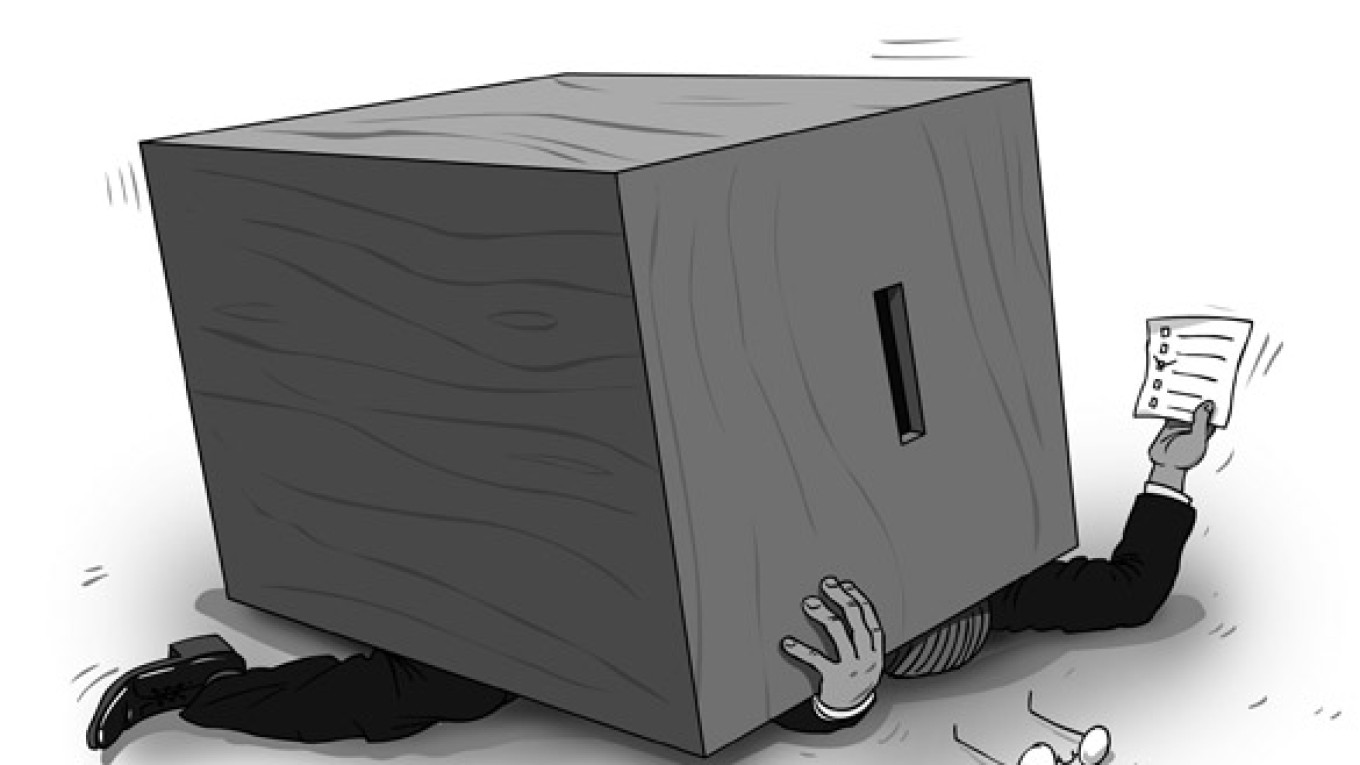The Oct. 11 elections held in 75 of Russia’s 83 regions ended with an unusual emotional outburst after three opposition parties claimed that there were massive falsifications of the results. After the parties stormed out of the State Duma on Oct. 14, they demanded an urgent meeting with the guarantor of the Constitution — President Dmitry Medvedev. By doing so, they placed Medvedev in a difficult position, essentially forcing him to react in some form or another to the charges of widespread election fraud by the ruling United Russia party, headed by none other than Prime Minister Vladimir Putin. In is impossible to imagine that Medvedev could offer even the slightest support for the opposition’s complaints since that would represent a direct challenge to Putin and a terrible blow to their ruling tandem.
As for the elections, the general impression was that United Russia went way too far this time in exploiting its administrative resources. Internet testimonials as well as the independent print media were overflowing with eyewitness accounts detailing how election results were falsified at polling stations all across the country.
Since the ballot-counting is basically done by hand, there are three main methods to pad election results:
1. Early voting. This usually gives the ruling party an additional 5 percent of the vote. In the most flagrant cases, up to 20 percent of the voters in a given district vote can be gained by manipulating early voting and absentee ballots. And as a rule, independent election observers and opposition members have little control over this stage of the voting process.
2. The “carousel” method, generally carried out with the collusion of members of specific election commissions. Groups of people are bused from one district to another, given fresh ballots in each and thereby cast their votes repeatedly for the ruling party. It is difficult for observers to catch such violations because it would require manually checking every name on every passport presented against the list of local registered voters.
3. Ballot-box stuffing. This can be done at various stages of the voting process and even after the polling station has closed. It is theoretically possible for an observer to catch someone stuffing ballot boxes, but only if he keeps his eyes on them at all times. It is even more difficult to personally accompany each of the “mobile ballot boxes” that are taken off the premises to receive the ballots of housebound voters. The number of these mobile boxes can reach eight or nine per polling station, requiring an equal number of observers to monitor them all. The lower the voter turnout at any given district, the easier it is to manipulate the returns using ballot-box stuffing. For example, in the recent Moscow City Duma elections, many analysts calculated voter turnout at 20 percent to 24 percent, although the city election commission put the figure at 36 percent. In can be inferred that the “extra” votes went to United Russia.
In addition to these methods, some districts don’t even bother counting ballots at all. Instead, election officials simply write in the necessary percentage received by each party, as dictated by orders from above.
It is interesting to note that the Oct. 11 vote and the Oct. 14 protest in the Duma coincided with U.S. Secretary of State Hillary Clinton’s visit to Moscow. She met with representatives of opposition parties that do not hold seats in the Duma. But both during her visit and directly afterward, the U.S. administration was restrained in its criticism of election irregularities. The Russian mass media seized on a comment reported in Kommersant by U.S. President Barack Obama’s chief Russia adviser, Michael McFaul, that the White House would stop publicly criticizing Russia’s “sovereign democracy.”
Will this restraint serve as the foundation for Obama’s “reset” in U.S.-Russia relations? Many high-ranking members of the Obama administration believe that it would be better to focus less on Russia’s internal democracy and human rights issues and more on the most pressing global issues that the two countries can cooperate on, such as curtailing Iran’s nuclear program or working together on a joint missile defense program.
While the United States has apparently chosen a hands-off approach toward internal Russian affairs — at least for the time being — Russians also demonstrated their own version of a hands-off policy after the recent elections. The overwhelming majority of Russians were highly apathetic about the allegations that the party in power trampled over their fundamental democratic rights to choose their own leaders.
Georgy Bovt is a co-founder of the Right Cause party.
A Message from The Moscow Times:
Dear readers,
We are facing unprecedented challenges. Russia's Prosecutor General's Office has designated The Moscow Times as an "undesirable" organization, criminalizing our work and putting our staff at risk of prosecution. This follows our earlier unjust labeling as a "foreign agent."
These actions are direct attempts to silence independent journalism in Russia. The authorities claim our work "discredits the decisions of the Russian leadership." We see things differently: we strive to provide accurate, unbiased reporting on Russia.
We, the journalists of The Moscow Times, refuse to be silenced. But to continue our work, we need your help.
Your support, no matter how small, makes a world of difference. If you can, please support us monthly starting from just $2. It's quick to set up, and every contribution makes a significant impact.
By supporting The Moscow Times, you're defending open, independent journalism in the face of repression. Thank you for standing with us.
Remind me later.


